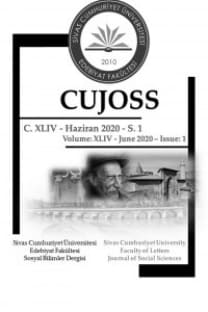Searching for Solidarity Within the Context of Personal and Social Affairs in E.M. Forster’s a Passage to India
Bu makale, İngiliz yazar E.M Forster’ın A Passage to India adlı eserinde, aynı zamanda genel olarak kendi liberal fikirlerini yansıtan bireysel ve sosyal boyuttaki ilişkileri incelemeyi amaçlamaktadır. Romanda, karakterlerin farklı sosyal ve kültürel yapılardan gelmelerine karşılık, sürekli bir dayanışma ve birlik arayışı içinde olmaları önemli bir tema olarak ortaya çıkmaktadır. Fakat, diğer taraftan, roman karakterleri arasında yakın ilişkiler kurma ve bunları sürdürmeye yönelik olarak gösterilen tüm çabalar, sonunda ırk, din ve gelenek gibi sosyal, kültürel ve politik faktörlerin etkisi ile sürekli olarak engellenmektedirler. Bu bağlamda, romandaki karakterler ve gelişen olayların tasvirinde, genel olarak negatif bir yaklaşımın hakim olduğu görülmektedir. Böylece romanın, bireysel ve sosyal ilişkiler hakkında kesin bir iyimserlik sunamadığı sonucuna ulaşabiliriz. Aslında roman bu konuda kesin olarak iyimser veya kötümser bir tutum sergilemekten çok, evrensel dostluğun gerçekleşmesini oldukça zor kılan konuların ve problemlerin bir boyutunu ortaya koymaktadır.
E.M Forster’ın A Passage to India Adlı Eserinde Kişisel ve Toplumsal Olaylar Bağlamında Dayanışma Olgusunun İncelenmesi
This paper attempts to explore the intense human and social affairs in E.M Forster’s A Passage to India that in essence reflect his liberal ideas as to what life should constitute. In responding to the social and cultural differences between the characters, the search for solidarity emerges as an outstanding theme in the novel. However, on the other hand, the ongoing efforts to establish and maintain these intense relations in the novel appear to be constantly plagued by social, cultural and political factors such as race, religion and tradition. In this respect, the flow of the narration is marked by the heavy influence of negative mood surrounding the relations as well as the events. Thus, we can infer that the novel can not offer a precise hopefulness about human and social affairs. It is in a strict sense neither optimistic nor pessimistic, but rather reveals one dimension of the issues and problems that render -not impossible, but very difficult- the quest for universal friendship.
___
- ADVANI, Rukun. (1984), E.M. Forster as a Critic, London: The Macmillan Press.
- COLMER, John. (1967), E.M. Forster A Passage to India, London: The Camelot Press.
- COLMER, John. (1975), E.M. Forster The Personal Voice, London and Boston: Routledge and Kegan Paul Ltd.
- FORSTER, E. Morgan. (1979), A Passage to India, Cambridge: Penguin Books.
- FORSTER, E. Morgan. (1972), “Two Cheers for Democracy”, in Peter Widdowson, E.M. Forster’s Howards End, London: Sussex University Press.
- FURBANK, P.N. (1979), “Forster and Bloomsbury Prose”, in G.K. Das and John Beer eds. E.M. Forster: A Human Exploration, London: The Macmillan Press Ltd.
- HEWIT, Douglas. (1988), English Fiction of the Early Modern Period, London and New York: Longman.
- MACAULAY, Rose. (1970), The Writings of E.M. Forster, London: The Hogart Press.
- PARRY, Benita. (1977), “A Passage to India: Epitaph or Manifest”, in G.K. Das and John Beer, eds. E.M. Forster: A Human, London: The Macmillan Press Ltd.
- STONE, Wilfred. (1966), The Cave and the Mountain, California: Stanford University.
- ISSN: 1305-5143
- Yayın Aralığı: Yılda 2 Sayı
- Yayıncı: Sivas Cumhuriyet Üniversitesi Edebiyat Fakültesi
Sayıdaki Diğer Makaleler
Saint-Exupery’nin Küçük Prens Anlatsında Dostluk Arayışı
Albert Camus’nün ‘Doğrular’ Adlı Oyununda Anlam Ve Değer Bakımından Kişi, Eylem Ve Özgürlük
Son Dönemlerde Yaşanan Krizlerin İşletmeler Üzerindeki Olumlu Etkilerinin Analizi
Muzaffer AYDEMİR, M. Kemal DEMİRCİ
On Fichte’s Reconstruction of The Kantian Unity of The I
Alman Kültürü ve Edebiyatında Uğursuz Deniz Kızı Olarak Mitleştirilen Kadın
Toplumsal Yapı Ve Değişme Kuramlarını Paradigma Temelli Bir Sınıflandırma Denemesi
